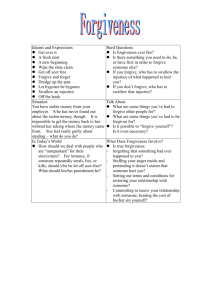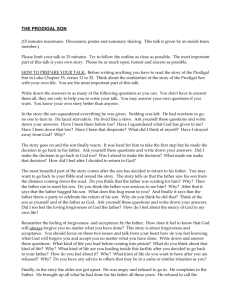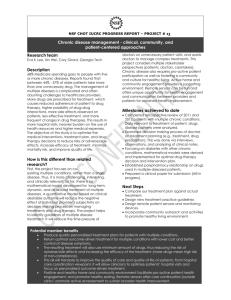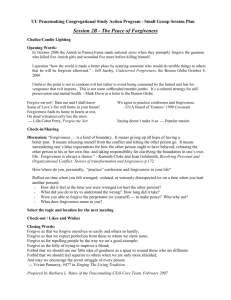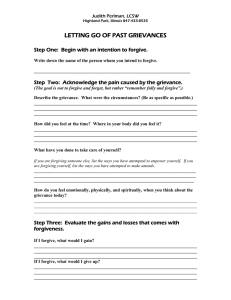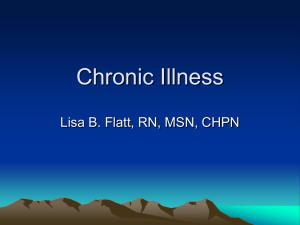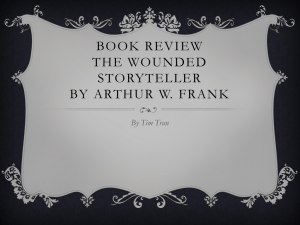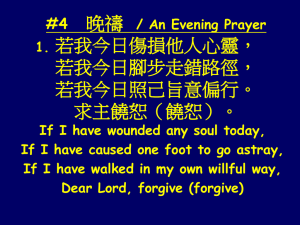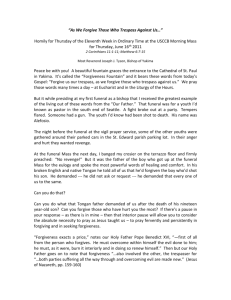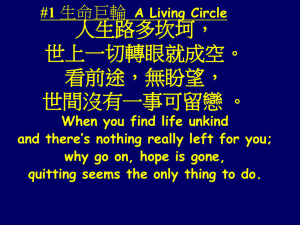Connectedness is Vital to your Wellbeing Dr. Andrew
advertisement
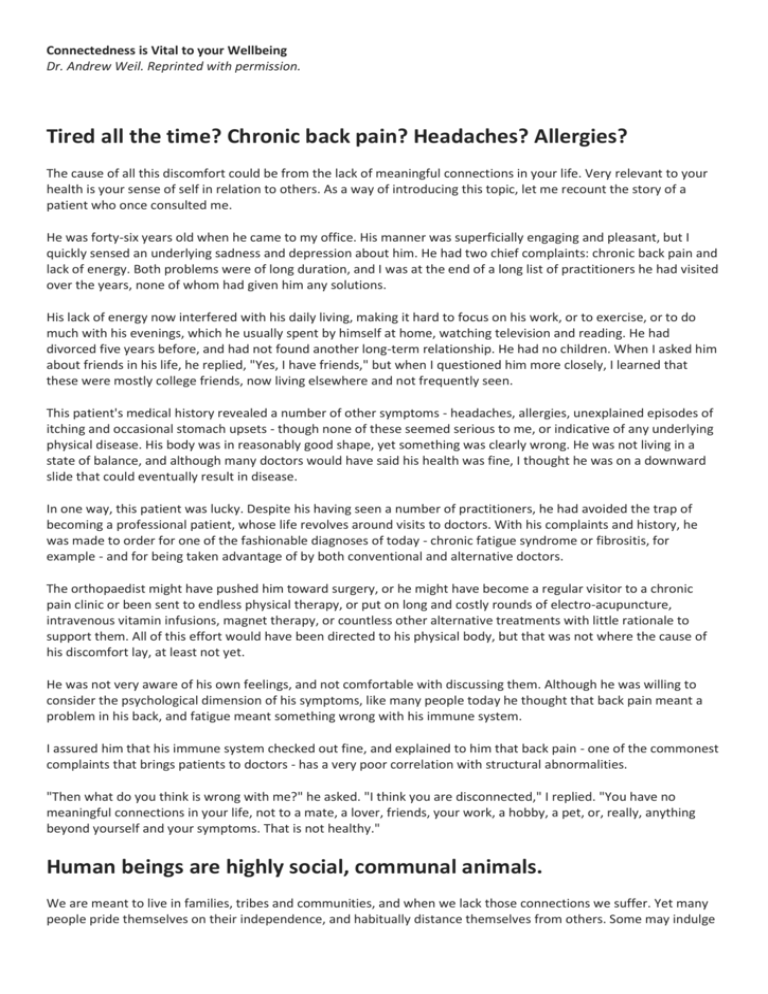
Connectedness is Vital to your Wellbeing Dr. Andrew Weil. Reprinted with permission. Tired all the time? Chronic back pain? Headaches? Allergies? The cause of all this discomfort could be from the lack of meaningful connections in your life. Very relevant to your health is your sense of self in relation to others. As a way of introducing this topic, let me recount the story of a patient who once consulted me. He was forty-six years old when he came to my office. His manner was superficially engaging and pleasant, but I quickly sensed an underlying sadness and depression about him. He had two chief complaints: chronic back pain and lack of energy. Both problems were of long duration, and I was at the end of a long list of practitioners he had visited over the years, none of whom had given him any solutions. His lack of energy now interfered with his daily living, making it hard to focus on his work, or to exercise, or to do much with his evenings, which he usually spent by himself at home, watching television and reading. He had divorced five years before, and had not found another long-term relationship. He had no children. When I asked him about friends in his life, he replied, "Yes, I have friends," but when I questioned him more closely, I learned that these were mostly college friends, now living elsewhere and not frequently seen. This patient's medical history revealed a number of other symptoms - headaches, allergies, unexplained episodes of itching and occasional stomach upsets - though none of these seemed serious to me, or indicative of any underlying physical disease. His body was in reasonably good shape, yet something was clearly wrong. He was not living in a state of balance, and although many doctors would have said his health was fine, I thought he was on a downward slide that could eventually result in disease. In one way, this patient was lucky. Despite his having seen a number of practitioners, he had avoided the trap of becoming a professional patient, whose life revolves around visits to doctors. With his complaints and history, he was made to order for one of the fashionable diagnoses of today - chronic fatigue syndrome or fibrositis, for example - and for being taken advantage of by both conventional and alternative doctors. The orthopaedist might have pushed him toward surgery, or he might have become a regular visitor to a chronic pain clinic or been sent to endless physical therapy, or put on long and costly rounds of electro-acupuncture, intravenous vitamin infusions, magnet therapy, or countless other alternative treatments with little rationale to support them. All of this effort would have been directed to his physical body, but that was not where the cause of his discomfort lay, at least not yet. He was not very aware of his own feelings, and not comfortable with discussing them. Although he was willing to consider the psychological dimension of his symptoms, like many people today he thought that back pain meant a problem in his back, and fatigue meant something wrong with his immune system. I assured him that his immune system checked out fine, and explained to him that back pain - one of the commonest complaints that brings patients to doctors - has a very poor correlation with structural abnormalities. "Then what do you think is wrong with me?" he asked. "I think you are disconnected," I replied. "You have no meaningful connections in your life, not to a mate, a lover, friends, your work, a hobby, a pet, or, really, anything beyond yourself and your symptoms. That is not healthy." Human beings are highly social, communal animals. We are meant to live in families, tribes and communities, and when we lack those connections we suffer. Yet many people pride themselves on their independence, and habitually distance themselves from others. Some may indulge in isolation as a defensive strategy - possibly developed in reaction to painful emotional experiences. Others may never have learned how to connect meaningfully to anyone or anything beyond themselves. Of course, most people need experiences of solitude as well, some more than others, but if solitude is not balanced by connectedness, it is often productive of illness, first on the spiritual level, then the mental/ emotional level, and finally crystallising into the physical structure of the body. Those familiar with the philosophy of traditional Chinese medicine will recognise an analogy here. Chinese doctors say that all visible illness - illness of the body - is preceded by invisible illness; that is by illness of the spirit, of the circulation of energy through the body. This is why I told my patient that he was not sick in the Western medical sense, but was likely to become so if he did not correct what was missing in his life. Even people who are married, have children, and seem quite involved with the world can nonetheless suffer from Disconnection Syndrome and its long-range detrimental effect on health. Disconnection is an inner experience; the suffering it brings can be all the more intense when it occurs in the midst of a life apparently full of other people. The problem is self-absorption - failure to recognise other beings as meaningful and worthy of attention. Connectedness is vital to your well-being. You can eat as much salmon and broccoli as you can, take antioxidants for the rest of your life, breathe terrifically, and walk all over the earth, but if you are disconnected, you will not achieve optimum health. I gave my patient a number of suggestions for changing his life, including working with a therapist to get at the root cause of his isolation; getting a puppy to love and care for; finding a hobby that would involve him with a group; and doing some service work - a sincere effort to take seriously a human being's responsibility to help others. Even if you consider yourself very well connected, have a loving family, and frequently donate to charities, you can benefit from the projects I am asking you to undertake. I want you to think of some way you can be of service to at least one other person. And then, reach out and connect with that person. Then, in addition to all of this, I want you to resume connection with someone from whom you are estranged - in other words, practice forgiveness. By forgiving, you benefit yourself with inner peace, no matter what the response from the other person. It is even possible to practice forgiveness toward persons who are unreachable or even deceased, because you still carry them in your memory and your heart, and can enter into an inner dialogue with them. In his book Healing into Life and Death, Stephen Levine gives a forgiveness meditation that can be used in this way. I am going to quote part of it as an example of how you can forgive someone inwardly even if external communication is not possible. Begin by slowly bringing into your mind the image of someone for whom you have some resentment. And silently in your heart say to this person, "I forgive you." "I forgive you for whatever pain you may have caused me in the past, intentionally or unintentionally, through your words, your thoughts, your actions. However you may have caused me pain in the past, I forgive you. "Through whatever you didn't do - however the pain came to me through you, I forgive you." Of course, if you decide to try this meditation, you should do it with full attention and concentration, and no distractions. Feel free to change the wording to suit your own style and needs, and notice how you feel afterward. Healing relationships, emotional pain, and the sense of isolation that is at the root of much human disease is a necessary step in helping your healing system perform most efficiently. A programme for gaining health that omitted this kind of work would be incomplete.
